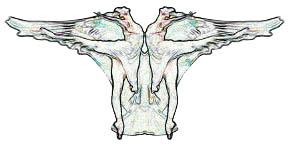Origin(s):
Other References:
POB Forum on utw_9-1: (A forum for expanding SOCIAL consensus on this subject through P.I.I.R.A. APPRAISAL) |
MATURING BEYOND "MONEY" AND "TRADE" AS PRINCIPAL FORMULAS OF SOCIAL RESOURCING TO A REGENERATIVE AND DISTRIBUTIVE "COMMONS"Universal Commonwealth and Cohesive Society formula UTW_9-1 for maturing Living Society toward Universal Thriving Wellness and Well-Being in the Ten Sights living endeavor category of Life Practice and Resourcing
The following is an adapted excerpt from a video presentation (below) by Anitra Nelson to the Marxist Education Project on February 26, 2022 that is being adopted as this UCCS formula of social resourcing.Imagine a Global network of collectively sufficient cell wide communities; each responsible for the sustainability of the local environments of which they live, communities of variable sizes; _ bioregions offering direct and efficient forms of production; producing locally…as close as is feasible to end users. Each diverse small community caring for Earth as in their locales, empowered, relatively autonomous, organized horizontally (internally), seamlessly networked locally and globally. We have personal property, but no private property. The entire Earth is commons with clear and universal principles for commoning, sharing land through secure and fair use rights. Everyone contributes a set amount of hours per week to collective production and in return their basic needs are met. How? Each household guesstimates their basic needs annually…a list that’s checked by others in working groups, and yet other working groups report on the capacity of the local area and capabilities of locals to fulfill various needs. Together, everyone plans on who gets what and how it will be produced, Then they work, and monitor, and tweak how they will fulfill those orders all through the year. Goods and services are produced for particular, already identified, people and neighbor beings…so we don’t need money or markets. We know who’s ordered what, so everything that’s produced is distributed according to those pre-identified people/neighbor beings and their needs. Once established, planning mainly relies on updating previous calculations and taking account of seasonal natural and living factors and changes. We discuss and negotiate compacts to produce for, and receive from, neighboring and distant communities for goods and services that satisfy needs we can’t fulfill locally. Compacts are like contracts…they are agreements…but they’re non-monetary and they operate on principles of mutual support, like our internal relations. Over consumption and waste is minimized, we pass on or leave things we don’t need in spaces for others to use. Collected stores are for emergencies and to fulfill unexpected gaps. Here, grassroots decision-making replaces production for trade, market exchange, and money. Decision-making focuses on real bio-physical, environmental, and social measures and values. The reward for contributing to collective daily tasks is the lifelong security of having our basic needs met. We engage together, respectfully, to make decisions on local production and the terms of exchange–the compacts with our neighboring producers. So real social and ecological values offer the democratic and material terms for replacing money as the organizing principle of society. |
